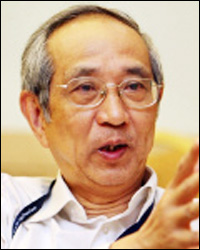“Korea-US alliance should be revised”
The long-standing military alliance between Seoul and Washington should be revised in order for South Korea to have a better relationship with China, said Pan Zhenqiang, a senior advisor of the China Reform Forum (CRF), Thursday.
The CRF is a policy-research organization officially affiliated to the Central Committee of the Communist Party of China (CPC). Pan visited Seoul to attend a conference dealing with Northeast Asia security issues hosted by the Asan Institute for Policy Studies, a local think tank.
“Any kind of bilateral cooperation whatsoever should not target a third nation,” said the Chinese expert during the forum. “The most critical problem (in Northeast Asia) is the Korea-U.S. alliance and it should be dealt with well (by Seoul).”
South Korea forged a Mutual Defense Treaty with the U.S. in 1953 as a deterrent against North Korea and communist expansion in the region.
The treaty allows U.S. forces to be stationed in South Korea. The U.S. has around 28,500 troops here.
Beijing considers a U.S. military presence in the North of the Korean Peninsula in the event of unification between the two Koreas would be a threat to its security.
“Seoul holds the key for peace and stability in the region,” said Pan. “Beijing and Seoul should keep in step with each other when dealing with Pyongyang as well.”
The expert insists that the long-standing Seoul-Washington military alliance is holding back the advance of Seoul-Beijing security ties.
The words from the Chinese expert come amid reports that Seoul and Washington are negotiating to create a new joint operations unit that would function after Seoul takes over wartime operational control of its troops from Washington in 2015.
The transfer of wartime operation control met with strong opposition from some conservative politicians and analysts here because they consider the alliance with the United States as a cornerstone of national security.
Observers say that Seoul is under pressure to make a strategic choice between the two big powers following the ascendancy of Beijing’s political leverage. <The Korea Times/Chung Min-uck>

























































